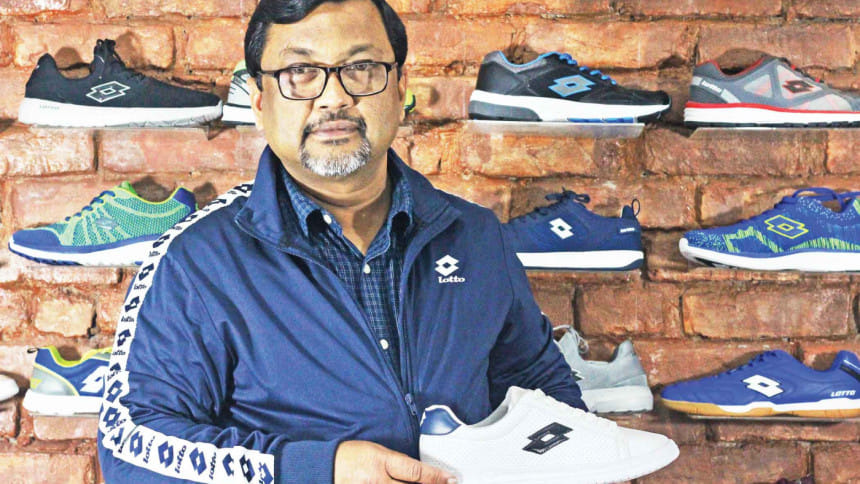Changing demands prove a boon for Lotto

The ongoing pandemic has been a blessing for Lotto Sport Italia as it enjoyed increased sales in Bangladesh for the past several months following a boom in the demand for low-cost, non-leather footwear products.
Since most people are staying at home to avoid infection, they now prefer to buy casual shoes at affordable prices, according to Kazi Jamil Islam, managing director of Lotto's Bangladesh operations.
The global outbreak forced Lotto Bangladesh to shut down its operations on March 23, three days ahead of a two-month nationwide lockdown aimed at curbing the spread of Covid-19.
At the time, Lotto employed nearly 1,300 people at its local production facility and since then Islam has recruited another 700 workers at a new facility to increase production and meet the growing demand.
"When the lockdown was eventually lifted on May 30, many people took up jogging and other physical activities in an effort improve their immune systems," Islam told The Daily star in a recent interview.
This led to the increased demand for low-cost washable footwear, he added.
Lotto, which has 100 retail outlets and about 100 franchisee shops across the country, then took this opportunity to expand its market share.
The Italian sportswear brand even started producing face masks considering the demand for such items amid the current health crisis.
Islam, also the managing director of Express leather Products, the world's fastest growing Lotto licensee, now plans to set up another factory in Tongi, where various sportswear such as jerseys and track suits will be produced.
He went on to say that when the pandemic began, everyone was puzzled about what to do since no one had ever experienced such a situation before.
Even during the nationwide shutdown, Islam continued to pay his employees and instructed them to remain available as work could have resumed at any time.
After finally reopening his operations, Islam observed that sales were gradually increasing.
Seeing that washable, non-leather products were the new hot ticket item, he immediately increased its production but was still unable to cope with the rapidly rising demand.
So, he opened another 11,000 square foot factory to compensate for the inadequate production capacity.
"Luckily, I had the raw materials for those items on hand and was able to do good business," he said.
With sales having gone up nearly 40 per cent year-on-year during the pandemic period, Islam increased the commission paid to retailers to 35 per cent and plans to open five more outlets in different parts of the country soon.
After realising that the ongoing pandemic would bring financial hardships for many, Islam started supplying some food items to his workers in a bid to make things easier for them.
But like most other businesses, Lotto Bangladesh lost vital sales during Eid this year, when most customers were still stuck at home in fear of the Covid-19 fallout.
In an effort to beef up his client base, Islam has also partnered up with Bangladesh Police to supply shoes.
Banks also helped the company to survive, turning non-profitable outlets into profitable ones, he said.
Although the company's profitability went down, Islam was still able to pay his staff, none of whom were terminated either.
Islam intends to further expand his business by increasing the number of its partners and franchisees rather than increase the number of his retail outlets across the country.
Lotto Bangladesh produces 60,000 pairs of shoes and 1.50 lakh pairs of slippers every month, he said.
Islam started his journey as a Lotto franchisee in 2011, when he opened a retail outlet in Dhaka's Uttara area.
After graduating from the University of Dhaka, Islam also studied at the Institute of Business Administration under the same university.
"I want double digit growth over the next five years and I want to see my employees are very happy," Islam said, adding that as per current statistics, his business growth is 25 per cent year-on-year.

 For all latest news, follow The Daily Star's Google News channel.
For all latest news, follow The Daily Star's Google News channel. 



Comments